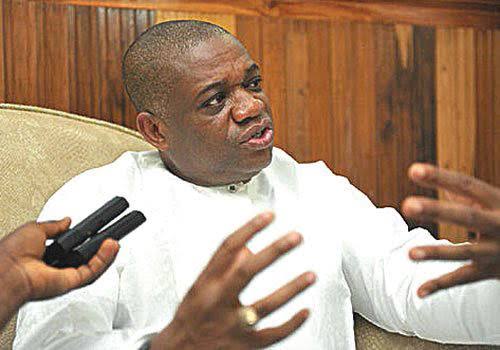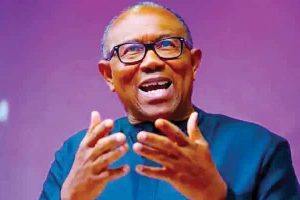
Senator Orji Uzor Kalu Reveals Threats from Simon Ekpa Over Biafra Agitation
Senator Orji Uzor Kalu, the lawmaker representing Abia North in the Nigerian Senate, has revealed that Simon Ekpa, the self-proclaimed leader of the proscribed Indigenous People of Biafra (IPOB), issued serious threats against him for refusing to support the separatist agitation for Biafra. Kalu made this shocking revelation during an interview with Arise Television on Monday, shedding light on the tense and increasingly dangerous situation surrounding the Biafra movement and the growing influence of Ekpa, especially within the southeastern region of Nigeria.
Simon Ekpa, who holds dual citizenship in Finland and Nigeria, was arrested by Finnish authorities on November 21, 2024, and later imprisoned by the district court of Päijät-Häme. Ekpa is facing charges related to the spreading of terrorist propaganda via social media in 2021, where he allegedly incited violence and terror across Nigeria’s southeast, exacerbating an already volatile region. The Finnish police’s actions are part of an international effort to curb the spread of violent extremism linked to separatist movements. In response to Ekpa’s arrest, the Nigerian government has been pressing for his extradition to face charges in Nigeria, and the Finnish court has set May 2025 as the deadline for filing formal charges against him.
During the interview, Kalu discussed his personal experience with Ekpa’s threats, which he claimed were made due to his position against the Biafran agitation. According to Kalu, Ekpa had called and threatened him, accusing him of not supporting the movement for the independent state of Biafra. Despite the intimidation, Kalu said that he remained resolute in his stance. “I left him to his conscience,” Kalu remarked, adding that his conscience guided him to believe in the unity of Nigeria and in the importance of democracy. Kalu stated that while he respects the rights of people to express their opinions, he does not support violent secession or the activities of groups like IPOB that have been linked to violence and disruption.
The senator further emphasized that his loyalty to Nigeria and his Igbo heritage is unshakable. “I am a democrat, an Igbo man at heart, and I believe in this country, and I believe in my tribe, where I come from, in Igbere,” Kalu said. He reiterated his commitment to Nigeria’s unity, stressing that regional agitations must be handled within the framework of the nation’s democratic processes.
Kalu also took the opportunity to call on Southeast governors to be more assertive and decisive in addressing the threat posed by non-state actors and separatist groups in the region. According to him, governors in the Southeast must not only condemn criminal activities but must also take active steps to dismantle the infrastructure supporting these movements. Kalu advocated for more proactive intelligence gathering and the establishment of more effective security measures to ensure peace in the region.
He noted that traditional security measures like roadblocks were outdated and no longer sufficient for dealing with the current security challenges. “Security is about intelligence,” Kalu stressed. He called on the federal government and state governors to collaborate in the fight against insurgency and ensure the safety of all Nigerians, particularly in the southeast, where separatist movements have historically gained traction.
In his remarks, Kalu also highlighted the need for the Nigerian military to focus on intelligence-driven security strategies rather than relying on physical roadblocks, which he argued were ineffective and only served to inconvenience the public. “Where people will come with transport and stop on the road is no longer viable; that is no longer security,” Kalu argued, pushing for a more modern approach to security that could address the growing challenges posed by criminal elements in the region.
The disclosure of threats from Simon Ekpa further underscores the tension surrounding the Biafran agitation, which continues to dominate political and security discussions in Nigeria. Ekpa, who has become a prominent figure in the movement, has been accused of using his platform to spread separatist propaganda, and his arrest by Finnish authorities signals a growing international concern about the spread of extremism and violence linked to the Biafra cause.
Kalu’s statements reflect a broader political and security dilemma facing Nigeria as it grapples with the challenges of managing separatist movements, ethnic tensions, and the destabilizing effects of non-state actors operating across the country. His call for stronger security measures and more decisive leadership in the Southeast adds to the growing consensus that a unified, national response is essential to curbing the threats posed by such groups.
As Ekpa’s extradition case continues to unfold, the debate around Biafra, the security of the Southeast, and the future of Nigeria’s unity remains highly contentious. Kalu’s unwavering stance against separatism, alongside his calls for greater security and intelligence efforts, highlights the deep divisions in the country over the issue of Biafra and what the future holds for the region. The coming months are likely to see intensified discussions on how to effectively address the root causes of separatist movements while ensuring the peace and security of Nigeria as a whole.





